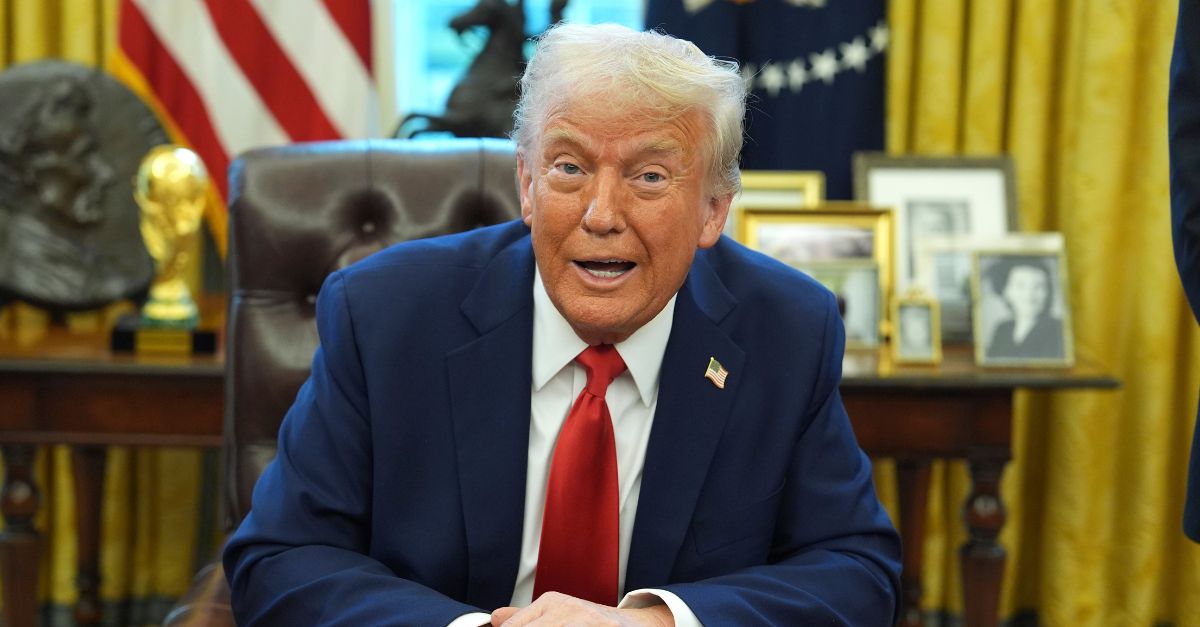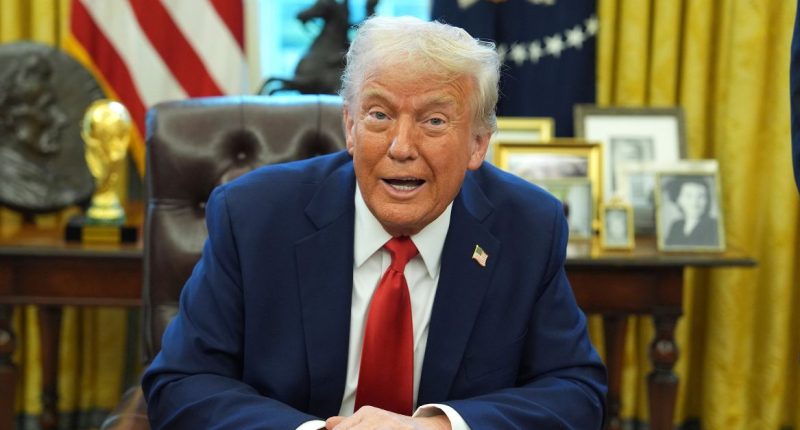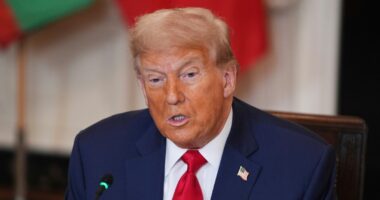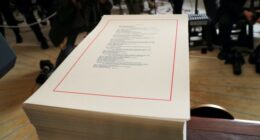
President Donald Trump speaks after signing an executive order in the Oval Office of the White House, Monday, Feb. 3, 2025, in Washington. (AP Photo/Evan Vucci)
A federal judge in Washington, D.C., has blocked the Trump administration from implementing a policy that would freeze funding on distributions to federal aid programs following an emergency hearing earlier in the day.
U.S. District Judge Loren AliKhan on Monday issued a temporary restraining order prohibiting the administration from “implementing, giving effect to, or reinstating under a different name” the directives in a controversial Office of Management and Budget (OMB) memo issued last week “with respect to the disbursement of Federal funds under all open awards.”
The memo at the heart of the litigation purported to make good on a series of executive orders issued by President Donald Trump outlining the administration’s spending priorities. It stated, in part (bold in original):
[T]o the extent permissible under applicable law, Federal agencies must temporarily pause all activities related to obligation or disbursement of all Federal financial assistance, and other relevant agency activities that may be implicated by the executive orders, including, but not limited to, financial assistance for foreign aid, nongovernmental organizations, DEI, woke gender ideology, and the green new deal.
The directive caused mass confusion throughout entities dependent on the federal government for funding as entire payment portals and websites went dark overnight.
In her 30-page order granting the restraining order, AliKhan said the government was effectively violating the doctrine of separation of powers.
“Defendants’ actions in this case potentially run roughshod over a ‘bulwark of the Constitution’ by interfering with Congress’s appropriation of federal funds,” she wrote. “OMB ordered a nationwide freeze on pre-existing financial commitments without considering any of the specifics of the individual loans, grants, or funds. It did not indicate when that freeze would end (if it was to end at all). And it attempted to wrest the power of the purse away from the only branch of government entitled to wield it. If Defendants’ actions violated the separation of powers, that would certainly be arbitrary and capricious under the APA.”
The restraining order is a progression from a short-term administrative stay AliKhan issued on Jan. 29 effectively stopping the measure from going into effect. The stay was issued in the case brought by the National Council of Nonprofits (NCN), the largest network of nonprofit organizations in North America — one of several lawsuits filed following the issuance of the stop-funding order.
The Trump administration responded to the myriad legal actions by issuing a follow-up memorandum rescinding the prior one.
“OMB Memorandum M-25-13 is rescinded. If you have questions about implementing the President’s Executive Orders, please contact your agency General Counsel,” the second memo stated.
During Monday’s hearing, the DOJ argued that the plaintiff’s case was moot, as OMB had rescinded the memo plaintiffs alleged was responsible for the funding freeze, explaining that guidance had been issued directing federal agencies not to rely on the memo. The attorney, Daniel Schwhy, also claimed that any funding freezes still in place were due to individual federal agencies “exercising their own discretion” to comply with a flurry of executive orders signed by President Donald Trump during his first week in office.
The DOJ went on to argue that none of the plaintiffs in the case could prove that the pause in their funding was related to the OMB memo as opposed to one of Trump’s executive orders. However, when AliKhan asked whether the DOJ could specify which executive order or orders were responsible for cutting off funding to the plaintiffs, Schwhy said he could not.
AliKhan responded by telling him that it “seems like a problem of your own making,” signaling early on in the hearing that she did not think the rescission of the OMB memo meant the plaintiffs’ case was moot.
In her order, the judge, a Joe Biden appointee, expressed her incredulity that the memo rescission was anything more than an attempt to end-around potential intervention from the court — specifically citing White House Press Secretary Karoline Leavitt’s post to X, formerly Twitter, after the memo was formally walked back by OMB.
“Within hours of OMB’s rescission, White House Press Secretary Leavitt announced that the rescission was to have no tangible effect on ‘the federal funding freeze,”” AliKhan wrote. “Moreover, she explained that the primary purpose of the rescission was ‘[t]o end any confusion created by the court’s injunction.’ That statement unambiguously reflects that the rescission was in direct response to this court’s issuance of an administrative stay on January 28. For Defendants to innocently claim that OMB’s post-stay actions were merely a noble attempt to ‘end[] confusion,’ strains credulity.”
AliKhan said that the White House’s effort was, to her, clearly disingenuous.
“By rescinding the memorandum that announced the freeze, but ‘NOT … the federal funding freeze’ itself, it appears that OMB sought to overcome a judicially imposed obstacle without actually ceasing the challenged conduct,” the order states. “The court can think of few things more disingenuous. Preventing a defendant from evading judicial review under such false pretenses is precisely why the voluntary cessation doctrine exists. The rescission, if it can be called that, appears to be nothing more than a thinly veiled attempt to prevent this court from granting relief.”
A federal judge in Rhode Island on Friday also issued a restraining order blocking the administration from implementing the funding freeze after similarly rejected the mootness argument.
“The Defendants now claim that this matter is moot because it rescinded the OMB Directive,” the Friday order from U.S. District Judge John McConnell stated. “But the evidence shows that the alleged rescission of the OMB Directive was in name-only and may have been issued simply to defeat the jurisdiction of the courts. The substantive effect of the directive carries on.”








